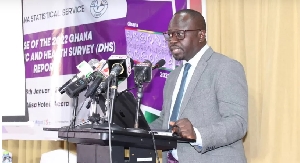 Samuel Kobina Anim, Government Statistician
Samuel Kobina Anim, Government Statistician
In the third quarter of 2023, 1.9 million youth aged 15 to 35 years in the country were not in education, employment, or training (NEET) according to the 2023 Annual Household Income and Expenditure Survey (AHIES).
The survey put together by the Ghana Statistical Service (GSS) added that females representing 1.2 million outnumbered the males representing 715,691 in the third quarter of 2023.
On regional basis, one in every three youth not in education, employment, or training resided in the Greater Accra Region, with over half a million (565,360) youth not engaging in any of the three activities.
Four other regions, besides Greater Accra, also recorded youth NEET over 100,000: the Ashanti (352,503), Central (155,171), Eastern (143,601), and Western (137,865) regions.
“Greater Accra had the highest NEET rate with a little over a quarter (26.9%) of the population 15 to 35 years not engaged in education, employment, or training. North East Region (19.5%) had the second highest rate with about one in five youth NEET. All regions except Bono East (8.3%) had NEET rates in double figures. The NEET rate was higher for youth in urban areas (20.6%) than for rural residents (15.0%),” it stated.
Q3 2023 and Q3 2022
However, comparing the Q3 2023 with the same period in 2022, NEET fell by 5.9 percentage points from 24.1 to 18.2 percent as the total number of youth not in education, employment, or training decreased by almost half a million (462,998).
Also, between the third quarters of 2022 and 2023, the percentage of youth NEET declined in all regions except Greater Accra which experienced a marginal increase of 0.5 percentage points.
“Greater Accra was the only region to record increases in youth NEET for both males and females between Q3 2022 and Q3 2023. In the other 15 regions, youth NEET declined for both males and females except for Western which recorded a divergent trend by sex: a 5.9 percentage point decrease for males and a 0.3 percentage point increase for females,” a statement issued by GSS to mark World Youth Skills Day stated.